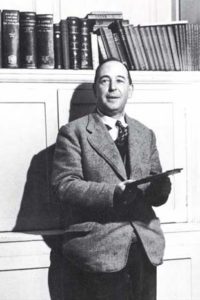 C. S. Lewis always claimed not to be interested in politics. To be sure, it was not a primary interest. Yet he often engaged in commentary and/or questions with his American correspondents over the state of American politics and government.
C. S. Lewis always claimed not to be interested in politics. To be sure, it was not a primary interest. Yet he often engaged in commentary and/or questions with his American correspondents over the state of American politics and government.
As the 1952 presidential election approached, Lewis turned to Vera Gebbert for her opinion on what was transpiring, asking her if even Americans really understood what was happening on their political scene. He told her about another American correspondent who had sent him eight pages of political analysis “so hot that they nearly burnt my fingers.” That correspondent had concluded that the Democrats should really be known as the “Dumbocrats” and were “a sort of mixture of Hitler, the Russian secret police, and the inmates of the village lunatic asylum.”
One cannot truly evaluate a person’s views of another nation in a vacuum.
Comparisons are necessary. What better way to evaluate Lewis’s views on
America than to look also at his views on the Britain of his day? If he entertained
a low opinion of British government and culture, would we say he was anti-British? Or would he merely be pointing out the problems that needed to be corrected?
When Nathan Comfort Starr sought to bring Lewis to America and Lewis had to decline, he did invite Starr to Britain, but not with a sterling recommendation, referring to Britain as “this luckless country.” In offering the same invitation to Warfield Firor, the image of Britain he used in the letter was “this bleak island,” and he wondered why Firor would even want to visit it. Why the bleak state of affairs?
For Lewis, the blame fell on the Labour government and its socialist policies, which not only ruined the nation economically but was siphoning off its liberties and making Britain a less-than-stellar partner for the United States. As he explained to Firor, the government always seemed to be thinking of ways to take more liberties from the people. “Try not to judge us by our rulers,” he pleaded.
 By 1954, rationing in Britain finally came to an end, thanks to the new Conservative government. He informed Vera Gebbert he wouldn’t be needing her gifts anymore, but there was a possibility, if she really missed sending him all those items, that she might be able to begin anew, noting that if the Socialists ever regained the majority, she could once again show her kindness “by supplying us, not with little luxuries, but with the necessities of life!”
By 1954, rationing in Britain finally came to an end, thanks to the new Conservative government. He informed Vera Gebbert he wouldn’t be needing her gifts anymore, but there was a possibility, if she really missed sending him all those items, that she might be able to begin anew, noting that if the Socialists ever regained the majority, she could once again show her kindness “by supplying us, not with little luxuries, but with the necessities of life!”
He continued to sound the warning, such as when Gebbert was thinking of moving permanently to Britain. While they would be glad to welcome her, she needed to know the truth: there would always be the threat of a revival of a government ruled by the Socialists, “which would finish us off completely.”
 Lewis also contrasted the blessings Gebbert had in America with the current state of England, saying, “Try living in ‘free’ England for a bit, and you would realize what government interference can mean! And not only interference, but interference in a ‘school marm’ form which is maddening.”
Lewis also contrasted the blessings Gebbert had in America with the current state of England, saying, “Try living in ‘free’ England for a bit, and you would realize what government interference can mean! And not only interference, but interference in a ‘school marm’ form which is maddening.”
Then he added this quip: “There are times when one feels that a minister or two dangling from a lamp post in Whitehall would be an attraction that would draw a hard worked man up to London!”
So for those who think C. S. Lewis had nothing to say about politics and government, I offer these excerpts from my book as a counterbalance.
